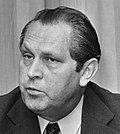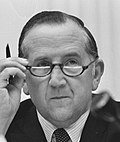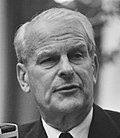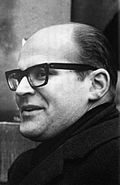De Jong cabinet
De Jong cabinet | |
|---|---|
52nd Cabinet of the Netherlands | |
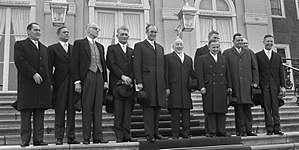  The installation of the De Jong cabinet on 5 April 1967 | |
| Date formed | 5 April 1967 |
| Date dissolved | 6 July 1971 (Demissionary from 28 April 1971) |
| People and organisations | |
| Head of state | Queen Juliana |
| Head of government | Piet de Jong |
| Deputy head of government | Johan Witteveen Joop Bakker |
| No. of ministers | 14 |
| Ministers removed | 1 |
| Total no. of members | 15 |
| Member party | Catholic People's Party (KVP) People's Party for Freedom and Democracy (VVD) Anti-Revolutionary Party (ARP) Christian Historical Union (CHU) |
| Status in legislature | Centre-right Majority government |
| Opposition party | Labour Party |
| Opposition leader | Joop den Uyl |
| History | |
| Election | 1967 election |
| Outgoing election | 1971 election |
| Legislature terms | 1967–1971 |
| Incoming formation | 1967 formation |
| Outgoing formation | 1971 formation |
| Predecessor | Zijlstra cabinet |
| Successor | First Biesheuvel cabinet |
| Part of the Politics series |
![Azure, billetty Or a lion with a coronet Or armed and langued Gules holding in his dexter paw a sword Argent hilted Or and in the sinister paw seven arrows Argent pointed and bound together Or. [The seven arrows stand for the seven provinces of the Union of Utrecht.] The shield is crowned with the (Dutch) royal crown and supported by two lions Or armed and langued gules. They stand on a scroll Azure with the text (Or) "Je Maintiendrai" (French for "I will maintain".)](http://upload.wikimedia.org/wikipedia/commons/thumb/8/8f/State_coat_of_arms_of_the_Netherlands.svg/150px-State_coat_of_arms_of_the_Netherlands.svg.png) |
|---|
|
|
The De Jong cabinet was the cabinet of the Netherlands from 5 April 1967 until 6 July 1971. The cabinet was formed by the political parties Catholic People's Party (KVP), People's Party for Freedom and Democracy (VVD), Anti-Revolutionary Party (ARP) and the Christian Historical Union (CHU) after the election of 1967. The centre-right cabinet was a majority government in the House of Representatives. Piet de Jong of the Catholic People's Party was Prime Minister, with Johan Witteveen of the People's Party for Freedom and Democracy and Joop Bakker of the Anti-Revolutionary Party serving as Deputy Prime Ministers.[1]
Formation
Following the fall of the Cals cabinet on 14 October 1966 the Labour Party (PvdA) left the coalition, subsequently Queen Juliana appointed Senator Jelle Zijlstra (ARP), a former Minister of Finance as Prime Minister to form a rump cabinet with the Catholic People's Party and the Anti-Revolutionary Party. On 22 November 1966 the Zijlstra cabinet was installed and served as a caretaker government until the election of 1967.
After the election on 15 February 1967 the Catholic People's Party was the winner of the election even after losing 8 seats and had now a total of 40 seats in the House of Representatives. Incumbent Prime Minister Jelle Zijlstra was appointed as Informateur by Queen Juliana to start the cabinet formation process. After a first round of talks the Catholic People's Party, People's Party for Freedom and Democracy, Anti-Revolutionary Party and the Christian Historical Union agreed to form a coalition. On 6 March 1967 Queen Juliana appointed Vice-President of the Council of State Louis Beel (KVP), a former Prime Minister as the new Informateur to start the next formation fase.
On 9 March 1967 incumbent Deputy Prime Minister and Minister of Agriculture and Fisheries Barend Biesheuvel, the Leader of the Anti-Revolutionary Party was asked to form a new cabinet and was asked to become Formateur. The negotiations were troubled by objections from the People's Party for Freedom and Democracy about prospect of Barend Biesheuvel as Prime Minister because he served in the previous Centre-left Cals cabinet. On 20 March 1967 after long negotiations between the parties, Barend Biesheuvel failed to form a cabinet. In order to break the deadlock the Catholic People's Party suggested that incumbent Minister of Defence Piet de Jong (KVP) would be a good candidate to form a new cabinet. Piet de Jong a former Naval officer who served as a World War II submarine commander had a good reputation as an pragmatic minister and was seen as a compromis candidate. On 21 March 1967 Piet de Jong was tasked with forming a new cabinet and was appointed as Formateur. On 4 April 1967 the cabinet formation was completed and the De Jong cabinet was installed the next day.
Term
It was the first Cabinet of the Netherlands after World War II that completed a full term without any internal conflicts. The cabinet was confronted with a demand for democratic reforms in the society and it decided to democratise colleges and universities after the famous maagdenhuisbezetting. Plans were made to modernise politics by establishing an electoral system with districts or a chosen prime minister, but these plans were not implemented. Meanwhile, a pay pause due to the decision of employers and employees to raise wages was partly revoked after anti-government demonstrations and strikes. More unrest took shape in demonstrations against the war in Vietnam. Internationally, relations with Indonesia improved, resulting in a visit by president Suharto, which was, however, overshadowed by the occupation of the Indonesian embassy by Moluccans. The Soviet Union invasion in Czechoslovakia was seen as a reason to increase the defence budget.[2]
Changes
On 7 January 1970 Minister of Economic Affairs Leo de Block (KVP) resigned after disagreeing with the cabinets decision to increase the wages in the metal industry, but another reason was that he had lost the credibility to remain in office after the House of Representatives was highly critical in his handeling of the rising inflation after the introduction of the value-added tax (BTW) on 1 January 1969. Minister of Finance Johan Witteveen (VVD) served as acting Minister of Economic Affairs until 14 January 1970 when Member of the House of Representatives Roelof Nelissen (KVP) was appointed as his successor.







Cabinet Members
- Retained Retained this position from the previous cabinet.
- Res Resigned.
- Ad interim Served ad interim.
Living cabinet members
- As of 2024, the following cabinet members are still alive:
- Ministers
- Johan Witteveen – 12 June 1921
- Roelof Nelissen – 4 April 1931
- State Secretary
- Hans Grosheide – 6 August 1930
- Ministers
References
- ^ Template:Nl icon "Het succesvolle kabinet-De Jong 1967-1971". Historiek. 28 January 2014. Retrieved 16 March 2018.
- ^ Jan Willem Brouwer; Johan van Merriënboer (2001). Van buitengaats naar Binnenhof: P.J.S. de Jong, een biografie. Sdu Uitgevers. p. 10. ISBN 9789012087742.
External links
- Official
- Template:Nl icon Kabinet-De Jong Parlement & Politiek
- Template:Nl icon Kabinet-De Jong Rijksoverheid












